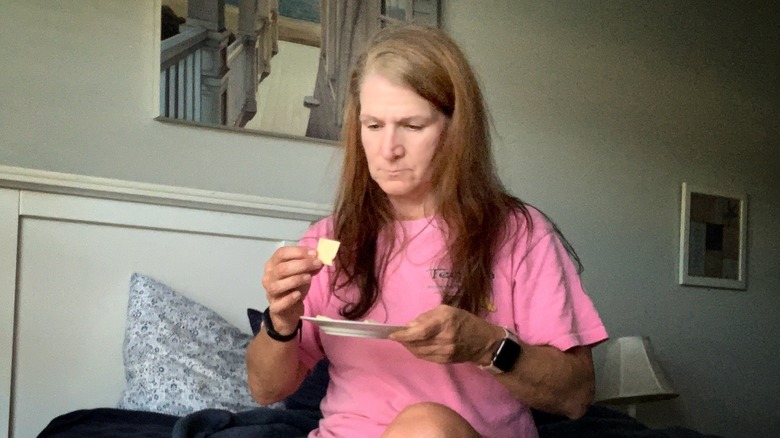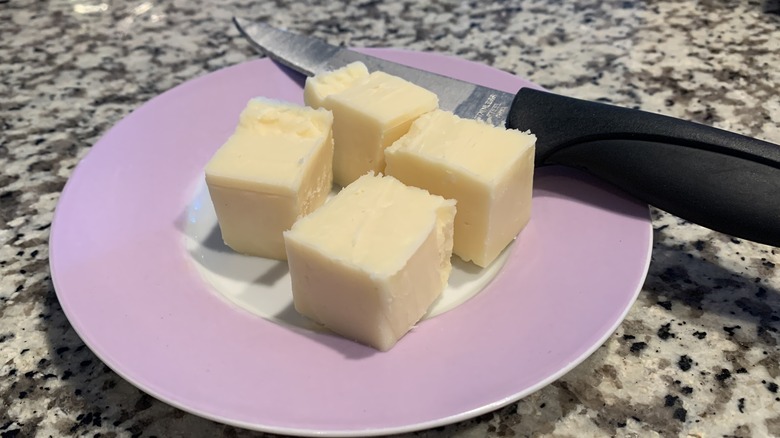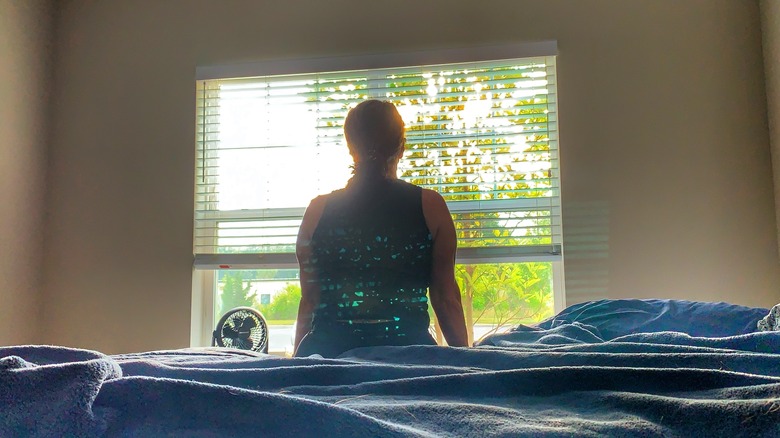We Tried Eating Cheddar Cheese To Fall Asleep In Record Time. Here's How It Went
A stressful day at work can often follow you home. You can try to go for a run or maybe practice stress-relieving tactics like yoga to let go of the day. Yet sometimes that stress stays on your mind, and it can be hard to get to sleep. Taking sleep aids might make waking up in the morning difficult, so you scour the internet for other ways to get you to sleep.
The old wives' tale says that drinking a warm glass of milk before bed might help you fall asleep because it has both tryptophan and melatonin. Some people have claimed that cheddar cheese helped them fall asleep fast, saying that it has more tryptophan than turkey. Ounce for ounce, cheddar cheese has 52 more milligrams of tryptophan than turkey, but you probably don't eat just an ounce of turkey at Thanksgiving.
As the resident skeptic at Health Digest, I looked for studies that showed that cheese can help you sleep. Although a 2023 review in Advances in Nutrition found somewhat of a link between dairy (mostly milk) and sleep quality, studies haven't looked directly at how eating cheddar cheese before bed will help you fall asleep quickly. So I decided to give it a try myself.
How much cheese helps you fall asleep?
I was at a loss trying to figure out how much cheese to eat before bed. I didn't want to eat too much, because it might make my digestive system work overtime. But if it's the tryptophan that supposedly helps people fall asleep, I wanted to get enough to notice a difference. So I searched for non-scientific studies to see if they could point me in the right direction.
A 2005 study by the British Cheese Board said that 72% of people got a good night's sleep after eating 20 grams of cheese 30 minutes before bed. That's just about an ounce. Because I wanted to see if cheese would help me fall asleep more quickly, I decided to triple that amount.
I didn't want any other foods to interfere with the potential effect of tryptophan, so I ate the cheese with nothing else. That's a lot of cheese to eat at once without crackers or fruit. I'm not a huge fan of cheddar cheese unless it's tucked and melted between two grilled slices of bread. After eating the cheese, I engaged in my typical evening ritual of reading and waited for the tryptophan to do its work.
Cheddar doesn't help you fall asleep faster
I'd love to report that cheddar cheese helped me fall asleep faster, but I cannot. I found no difference in my sleep onset after eating cheddar cheese. Granted, I didn't wake up hungry in the middle of the night because I ate cheese before bed. I didn't sleep any more soundly nor did I sleep longer as a result of cheddar cheese.
When you think about it, it doesn't make sense that eating cheddar before bed helps you fall asleep more quickly. I'll eat grilled cheese for lunch or dinner and don't necessarily feel tired as a result. I wonder if people who've said they've fallen asleep more quickly do so due to the high fat in cheese combined with their natural circadian rhythms.
You might have heard the myth that eating cheese before bed causes different types of dreams. That myth comes from that same study from the British Cheese Board. In particular, it said that cheddar cheese could make you dream of celebrities. As much as I would have loved to have dreams of Chris Evans, I didn't even remember my dreams from the night before.
So even though eating cheddar cheese at night prevented my late-night snacking, it didn't help me fall asleep quickly.



